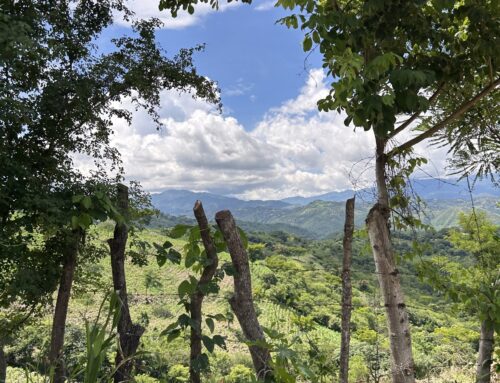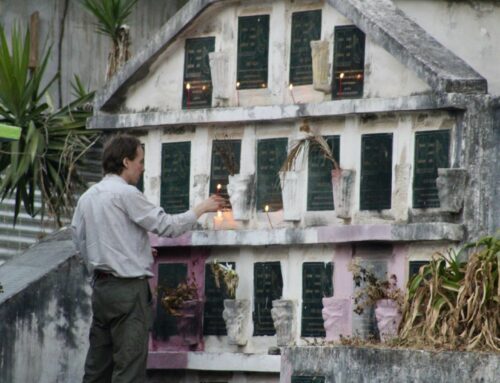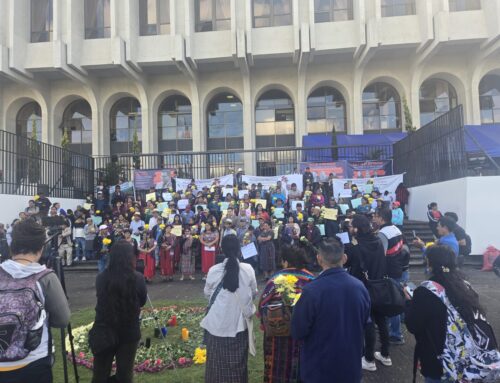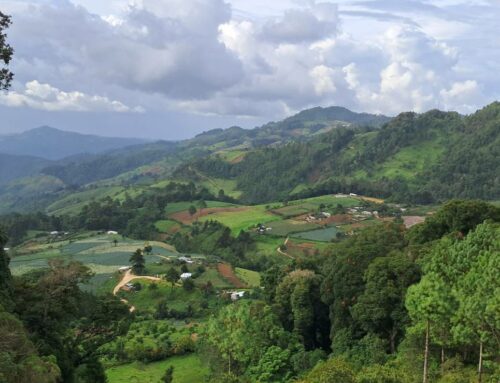Ethan, Internacionalista 2024, wrote this letter on October 9th, 2024 after a visit to ex-political prisoners in Huehuetenango.
The Cuchumatanes mountains stretch 400 kilometers across the departments of Huehuetenango and Quiché in northwest Guatemala, the tallest non-volcanic mountain range in all of Central America. The name might come from the Mam cuchuj and matán, meaning “the place forcefully joined,” or from the Nahuatl kochomatlán, meaning “the place of the parrot hunters.”
On a sunny afternoon in September, a group of 11 activists, lawyers, and international accompaniers organized by the Asamblea Departamental por la Defensa del Territorio– Huehuetenango (ADH) set out from the city of Huehue up the windy mountain road towards the altiplano. Our destination is the mountain town of Santa Cruz Barillas, where we intend to meet with a group of ex-political prisoners who had been criminalized while resisting the Spanish hydroelectric dam company Hidralia Energía. While the dam is no longer in operation, there are pressing questions about the fate of the land used by the company and the possibility of reparations for the Indigenous leaders who Hidralia defamed, imprisoned, and murdered to (unsuccessfully) quash resistance.
About an hour up, we pass the well-known Juan Diéguez Olaverri viewpoint, named after the mid-19th century Guatemalan poet who was exiled to Mexico for his opposition to the conservative military president Rafael Carrera. Olaverri’s nine stanza poem written in exile, ‘A los Cuchumatanes’, is inscribed on plaques on nine pillars encircling the viewpoint. I couldn’t find a translation of the poem online, so here’s my attempt at one, with the second and part of the third stanza reproduced here:
Del sol desfalleciente
a la última vislumbre,
vuestra elevada cumbre
postrer asilo da:
cual débil esperanza
allí se desvanece:
ya más y más fallece,
y ya por fin se va.
En tanto que la sombra
no embargue el firmamento,
hasta el postrer momento
en vos me extasié;
Your elevated peak
gives final asylum
to the last glimpse
of the faltering sun
who’s fragile hope
there fades away
more and more, dies
and finally, is gone.
As long as the shadow
does not seize the firmament
I am enraptured in you
until the last moment.
The Cuchumatanes– and the mountains of Guatemala more broadly– have been a postrer asilo, a final asylum, for the indigenous people of Guatemala many times over the centuries. The Maya Mam fled here following the occupation of their capital Zaculeu by their powerful Quiché neighbors in the 12th century, and again following the siege and fall of Zaculeu to the Spanish conquistador, Gonzalo de Alvarado, in 1525.
Over the course of the Guatemalan genocide, the mountains were a refuge for a huge portion of the 1.5 million displaced people. In the Ixil genocide trial, in both the capital and for a week in the city of Nebaj, at the foot of the Cuchumatanes, the witnesses’ testimonies run follow a similar pattern: The army came to our village. They killed our brothers, sons, fathers, and mothers. They raped our wives, sisters, daughters. They burned our houses and farms and even our animals. We fled to the mountains, where we stayed for a year, two years, fifteen years. In the mountains it was hard: there was no food, no resources, and the army hunted us. But we survived.
Guatemala is not the only place where mountains have been the last refuge for the persecuted, sheltering guerilla armies, refugees, and other populations unassimilable into empire throughout history. On the Arizona- Mexico border, where I spent some time doing desert migrant aid with No More Deaths, the flat places are crawling with border patrol, checkpoints, and fences, so migrants take to crossing the mountain ranges, the Pajarito wilderness near Arivaca, the little Ajo mountains further west, or the Baboquivari Mountains sacred to the Tohono O’odham people.
In the first books of the Bible, when the early Israelite people were still a nomadic band, mountains are places of sacred encounter: Avraham stopped from sacrificing Isaac on Mount Moriah, the Torah given at Mount Sinai, Moses buried on Mount Nevo. But when the Israelites settle, grow in strength, and become an established kingdom, suddenly the mountains are a threatening place to the established order, ‘high places’ where Other Gods are worshiped, that must be cut down.
As we continue our conversations and journey deeper into the Cuchumatanes, it’s clear that all is not well here. The prophets of the Book of Kings are not the only ones trying to cut down and tame the high places. In Cuilco, to the west, a group of Mexican refugees has crossed the border from Chiapas fleeing violence related to drug trafficking. In San Mateo Ixtatán, about 30 minutes upriver from Barillas, the government has just released 70 warrants for the arrest of land defenders fighting against a dam there. In Chiantlas, just 45 minutes north of Huehue, a new company is exploring building a mine.‘They are monsters,’ one of the indigenous leaders warns, ‘they will harass you, they will denounce you, and they will kill you– you cannot give them one inch, because they will do whatever it takes to remove whatever is in their way.’
As we stop for a late night coffee near Santa Eulalia, I realize I’m not sure what exactly this ragtag crew of organizers, accompaniers, and lawyers can do to stop the multibillion dollar international corporations, the weight of empire and capital dedicated to damming up the rivers and blasting open the mountains. The group of political prisoners we are going to meet, however, did just that: after a 46,000 to 9 vote against the dam, and almost a decade of communal conflict, criminalization, and murder, the organizers appealed to the World Bank to stop funding the dam for its human rights violations, and today the Canbalam river still flows freely, providing water for the Q’anjob’al Mayan farmers to grow corn and squash as they have for a thousand years.
Longing for the Cuchumatanes, Olaverri’s poem continues:
En alas del deseo,
por esa lontananza,
mi corazón se lanza
hasta mi pobre hogar
¡Oh, dulce madre mía,
con cuanto amor te estrecho
contra el doliente pecho
que destruyó el pesar!
On the wings of desire,
from this distance
my heart throws itself
to my poor home.
Oh, my sweet mother!
I grasp you against this suffering chest
with such love that your weight
almost destroys it.
As we reload the van and continue our journey along the winding roads to Barillas, I reflect on why Olaverri may have felt so much longing for these mountains that he dreamed of crushing his chest against them. There’s something about the high places like the Cuchumatanes, the rugged and the untamed, that provides refuge against the relentless assault of empire and sanctuary for migratory and marginal and sacred people and things.





Leave A Comment